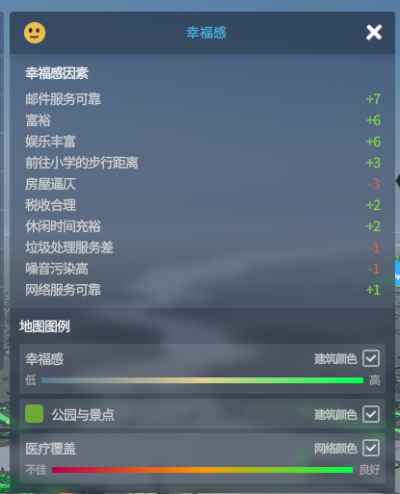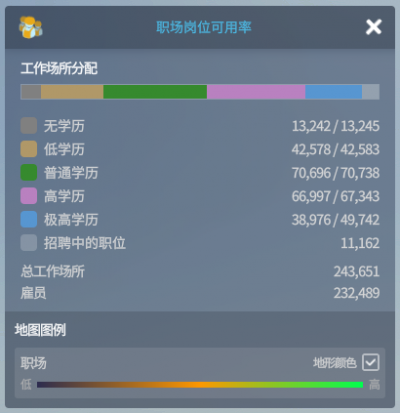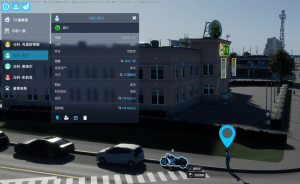市民
阅读
2025-07-14更新
最新编辑:xl123071
阅读:
更新日期:2025-07-14
最新编辑:xl123071
市民是游戏中模拟的主要人物。他们是住宅区房屋的居民,是工业、商业和办公区的劳动力,也是商业区的顾客。如果服务运行不正常,市民利益就会受到损害,但如果你管理好你的城市并满足他们的各种需求,他们也会受益并蓬勃发展。 市民总是从各种不同的活动中选择一些事情。这些活动包括去上班或上学、购物、睡觉或学习等日常活动。他们也有一些更罕见的活动,如犯罪、逃离犯罪现场、寻求医疗治疗和搬家。其中许多行为都具有模拟效果,如前往不同地方导致道路交通堵塞、购物导致经济模拟变化(尽管考虑到单个家庭时变化很小),以及接受医疗治疗占用医疗机构的患者名额。 市民可以拥有宠物。宠物主人从市民池中随机选择,宠物纯粹是装饰性的,不影响市民的幸福感或资源消耗、垃圾堆积或噪音污染,但它们为你的城市增添了一些趣味。
年龄
随着年龄的增长,游戏中的市民经历了四个人生阶段:
- 儿童 无法工作,也无法获得健康提升。他们一开始没有受过教育,如果有能力的话,他们会一直上小学。
- 青年 获得健康提升。他们可以工作,但许多人会努力继续接受教育。当乘坐汽车或公共交通工具旅行时,他们会选择最便宜的路线。
- 成年 可以工作,但有些人更愿意继续接受教育。当乘坐汽车或公共交通工具旅行时,他们会选择最快的路线。
- 老年 不能工作,慢慢地最大化失去健康,直到他们最终死亡。他们无法提高教育水平。当乘坐汽车或公共交通工具旅行时,他们会选择最舒适的路线。
*经测试,在当前版本(1.2.5f1)中,舒适度对市民对交通选择没有任何作用,当同一条路线上存在多种类型的交通工具时,市民的交通优先级始终满足公交>地铁>轮船>火车>电车,因此在修建城市交通工具时,应尽量避免重复路线修建。
幸福感
市民幸福感是代表市民生活满意度的整体价值。它是市民幸福感和健康的结合,影响着市民的行为和工作能力。玩家总是可以在市民信息面板中看到它,用鼠标悬停在家庭信息面板中的家庭组合幸福水平上,可以显示有关所有贡献价值细项的详细信息。
幸福感影响因素
| 因素 | 类型 | 积极影响 | 消极影响 |
|---|---|---|---|
| 教育服务 | 质量 | 教育建筑的邻近性、便捷性和开放性 | 由于交通、满负荷等原因,教育建筑很难进入。 |
| 休闲时间 | 充裕型 | 容易获得商品与进入工作场所以挤出休闲时间 | 商品和工作时间难以获得,挤占了休闲时间。 |
| 娱乐 | 充裕型 | 接近并快速进入娱乐场所,如公园和地标 | 由于交通堵塞、缺乏交通选择等原因,难以进入娱乐场所。 |
| 医疗保健覆盖范围 | 可依赖型 | 医疗保健建筑在附近或可以很快响应 | 医疗保健建筑很远,不堪重负,或者需要很长时间才能到达。 |
| 邮政服务 | 可依赖型 | 靠近邮局或邮箱,以及具有快速的邮件分拣能力。 | 附近没有邮局或邮箱。邮件分拣需求超过其最大容量。 |
| 互联网服务 | 可依赖型 | 网络容量高,覆盖范围广。 | 网络容量或覆盖率低。 |
| 噪音污染 | 数量 | 噪音污染低或可控 | 噪声污染普遍或超标。居民区的噪音污染是市民不想要的。 |
| 市民富裕度 | 数量 | 收入和/或收入净值高。 | 收入和/或收入净值低。 |
| 房屋大小 | 数量 | 大房子(低地价) | 小房子(高地价) |
| 税收级别 | 数量 | 低税收 | 高税收 |
如何提高幸福感
幸福感反映了公民的心理状态和安全感。满足他们的基本需求,例如拥有可靠的电力系统和干净的净水以及足够的污水处理使他们的厕所不会溢出,这将大大有助于为他们的幸福奠定坚实的基础。关注垃圾堆积,规划好住宅区避免空气、土地和噪音污染。在此基础上,良好的城市公共服务覆盖同时也有助于提升幸福感。此外,您需要确保您的公民的安全,因为生活在犯罪率高的区域会降低他们的幸福感。 市民重视功能齐全的邮政服务和高速的网络服务等便利设施,以及与家庭需求相匹配大小的住宅。家庭倾向于在低密度住宅区和小型公寓楼中寻找更大的房子,而单身人士和学生仍然可以在紧凑的公寓中蓬勃发展,比如那些在大型公寓楼和廉租住宅。公民本质上是消费者,可购买的商品多种多样也有助于提升幸福感。
休闲娱乐
市民们会利用他们的空闲时间在城市里消遣,例如参观公园和其他景点以及去购物或者在各种餐馆和酒吧享受快乐。这种对娱乐的需求会影响他们的幸福感,当他们的娱乐减少时,他们会寻求机会来增加娱乐。然而,并非所有的选择都是一样的,这意味着在不同的地方获得休闲娱乐需要不同的时间。市民选择去哪里消遣是基于他们在那里逗留时获得娱乐数量和速度,以及比较不同地点的寻路成本。 休闲娱乐可以从不同的地方获得。城市休闲包括以旅游景点和地标、公园、广场和各种体育场馆(如网球场、足球场或社区游泳池)之类的室内和室外娱乐场所。 商业娱乐可以从市民和游客去购物或者在商场和各种舒适的精品店来度过时光的商业区获得。 市民还可以从参加娱乐活动、参观当地酒吧或在当地餐馆品尝美味佳肴中获得消遣。这些休闲场所与其他场所的不同之处在于,市民和游客在该场所购买饮料和餐点以满足娱乐需求时,同时也会满足商品需求。 你的市民也可以决定去其他城市休闲旅游,本质上就是成为另一个城市的游客。全家人开车或乘坐公共交通工具,离开城市几天。 最后,天气会影响市民和游客在选择的休闲娱乐地点和行为。在阳光明媚和温暖的天气里,市民会在公园等户外区域寻求消遣,而在下雨、下雪或寒冷的天气下,市民会以购物和娱乐的形式在室内区域寻求消遣。
健康
你可以通过医疗信息视图查看市民的身体健康状况或住宅建筑整体的健康情况以及城市的平均健康水平。如果市民生病或受伤,他们的信息面板上会显示出来。健康受到医疗保健服务可用性的影响,市民居住在医疗设施附近,且在生病或受伤时能及时接受治疗,都会得到健康的被动提升,反之则会严重降低市民的健康水平。 生活在空气和地面污染区会对市民的健康造成负面影响。污染越强烈,影响越严重。如果城市的污水处理不足,污水将会倒流,从而降低市民的健康水平。垃圾堆积会影响市民的幸福感,也会影响他们的健康,因此为城市提供足够的垃圾管理对市民的生活质量至关重要,如果城市未能处理好这些问题,市民会通过微谈告诉你。 市民也有可能在没有受到上述因素直接影响的情况下生病。生病的概率取决于市民的健康状况:健康越高,生病的风险越低。然而,当市民生病时,他们的健康也会大幅下降。生病的市民会前往最近的医疗设施接受治疗,如果他们的健康状况太差,无法自行前往,则救护车会将他们送到最近的医疗设施。 市民如果在交通事故中受伤,也需要医疗。在这种情况下,救护车会赶到事故现场,将受伤的市民接走并送往医疗设施。与生病类似,市民在医院或诊所接受治疗。 生病或受伤得到治疗后,市民的健康会开始恢复。然而,在生病或受伤期间,市民有可能死亡。虽然死亡的概率通常较低,但它与市民当前的健康水平有关;健康越差,死亡的风险就越高。
教育
教育决定了市民能够从事的最高职位,并提高他们的工资和效率,同时也会减少水电消耗和垃圾产生。教育分为5个等级:未受教育、教育匮乏、受教育、教育良好和高等教育。每所学校为市民提供一种层次的教育。
- 小学将教育水平从未受教育提高到教育匮乏。只有儿童可以就读。
- 高中将教育水平从教育匮乏提高到受教育。只有青少年可以就读。
- 大学将教育水平从受教育提高到教育良好。青少年和成人都可以就读。
- 大学将教育水平从教育良好提高到高等教育。只有成年人可以就读。
青少年和成人可以选择上学或工作。为了做出这个决定,他们会计算选择工作的潜在收入,并将其与毕业后获得高等教育职位的收入进行比较,看看哪个更有利可图。有些市民更倾向于工作而非上学,即使未来的收入更高,他们也会选择工作而不是继续学习。
就业
公司位于商业、工业和办公区域,许多城市服务也提供工作岗位供市民就业。这些工作岗位根据复杂度分级,复杂度等级反映了市民的教育水平。城市服务的工作岗位在建筑存在期间保持不变,但当建筑升至更高等级时,可用的工作岗位的复杂度和组成会发生变化。更高复杂度的公司要求员工拥有更高的教育水平,而较低复杂度的公司则要求较低的教育水平。 区域专精企业也可以改变所需员工的数量。如果公司发现自己经营得不错,他们可以扩展员工队伍;相反,如果经营不善,他们可以缩小员工队伍,节省薪资成本,以保持盈利并度过难关。在不同类型的公司中,工业制造类企业往往对员工的教育要求较低,而商业和办公企业在提升等级时,对员工的教育要求则会逐渐提高。
工作效率
员工的教育水平代表了他们从事不同工作岗位的能力。受过更高教育的员工在工作中效率更高,因此他们对公司的效率和生产产出有更大的影响。当公司缺少员工时,较高教育水平的岗位对效率和产出的影响尤为明显。 员工可以从事任何与其教育水平相同或更低的工作。即使一个高教育水平的员工担任低级别工作,他们对公司效率的影响也会根据该工作的级别计算,而不是个人的教育水平,因为他们无法在这个岗位上发挥所有的能力。如果公司没有足够高学历的员工,就无法填补所有的职位空缺。这将导致效率和生产力的下降。 市民的幸福感也会影响公司效率,因此也会影响公司生产和盈利能力。幸福的员工对公司来说非常宝贵,所以照顾好市民的幸福感和健康是确保公司良好经营的重要前提。如果员工生病或受伤,他们就不能工作,这意味着公司会失去部分效率。等员工康复后,他们会重新回到工作岗位,继续为公司的效率做出贡献。
状态
某些事件可能会导致公民在信息面板上显示出特定的状态。尽管没有直接的方法可以解除公民的状态,玩家可以通过调查其原因并通过城市管理来改善整体情况。例如,如果市民生病,可能是因为污水管道发生倒流、污染蔓延到住宅区,或城市的医疗服务不足,导致健康状况下降,从而增加生病的概率。根据原因,你可以通过扩展城市服务,例如增强污水处理设施,建设医疗诊所或医院来解决市民的生病状态,并消除区域的负面影响,确保市民保持健康。下面是市民可能具有的不同状态概述。
 生病 - 生病的市民无法工作。只要他们保持生病状态,就会面临更大的死亡风险。需要接受医疗治疗才能从生病状态中恢复。
生病 - 生病的市民无法工作。只要他们保持生病状态,就会面临更大的死亡风险。需要接受医疗治疗才能从生病状态中恢复。 受伤 - 受伤的市民无法工作。市民在交通事故、建筑火灾和坍塌、自然灾害中可能受伤。需要接受医疗治疗才能从受伤状态中恢复。
受伤 - 受伤的市民无法工作。市民在交通事故、建筑火灾和坍塌、自然灾害中可能受伤。需要接受医疗治疗才能从受伤状态中恢复。 无家可归 - 无法支付住处租金且没有办法搬到其他住所或离开城市的市民会变得无家可归。他们没有固定住所,最终会寄身在城市的各个公园里。
无家可归 - 无法支付住处租金且没有办法搬到其他住所或离开城市的市民会变得无家可归。他们没有固定住所,最终会寄身在城市的各个公园里。 不安 - 不安的市民幸福感较低,导致他们的幸福值下降,他们的工作效率也会受到负面影响。此外,如果他们的幸福感一直没有提升,他们也有可能变成罪犯。
不安 - 不安的市民幸福感较低,导致他们的幸福值下降,他们的工作效率也会受到负面影响。此外,如果他们的幸福感一直没有提升,他们也有可能变成罪犯。 虚弱 - 虚弱的市民健康值较低,这会降低他们的幸福感,并对工作效率产生负面影响。健康较差的市民更容易生病,如果虚弱的市民生病,他们的健康值会急剧下降,导致他们更容易死亡,除非接受治疗。
虚弱 - 虚弱的市民健康值较低,这会降低他们的幸福感,并对工作效率产生负面影响。健康较差的市民更容易生病,如果虚弱的市民生病,他们的健康值会急剧下降,导致他们更容易死亡,除非接受治疗。 被困 - 处于危险或被困中的市民正处于困境中。市民处于危险中时,他们正身处着火的建筑物内;而被困的市民则是建筑物倒塌后,被压在废墟下。有时,身处着火建筑中的市民也可能会被困,无法逃脱。
被困 - 处于危险或被困中的市民正处于困境中。市民处于危险中时,他们正身处着火的建筑物内;而被困的市民则是建筑物倒塌后,被压在废墟下。有时,身处着火建筑中的市民也可能会被困,无法逃脱。 已疏散 - 已疏散的市民正在紧急避难所中。市民可以自行前往避难所,或者通过疏散巴士将他们接走并送到避难所。
已疏散 - 已疏散的市民正在紧急避难所中。市民可以自行前往避难所,或者通过疏散巴士将他们接走并送到避难所。
犯罪分子
市民可能会成为犯罪分子。虽然发生这种情况的可能性相对较低,但当市民的幸福感较低时,这种可能性会增加。当这种情况发生时,市民会为了谋取收入而实施犯罪活动,首先选择犯罪目标。犯罪目标是一个建筑,犯罪活动将在其中进行,犯罪分子通过比较城市中各个建筑的犯罪概率值来进行选择。最终,犯罪目标会从犯罪概率值最高的建筑群体中随机挑选出一个。居住在被犯罪分子选为目标的建筑内的市民将会暂时失去幸福感。 犯罪分子会前往目标建筑,在那里进行犯罪活动(这一过程需要一些时间),然后离开。当犯罪发生时,警报会触发并通知警察局,但在警车派出前会有一段延迟。如果警车在犯罪分子离开之前到达现场,犯罪分子会被逮捕。如果犯罪分子在警察到达之前离开,他们将逃脱法律制裁,可以继续犯罪活动。 当犯罪分子被“逮捕”后,警察会将其送往警察局或警察总部的监狱。一部分被逮捕的犯罪分子会被判刑入狱,他们会被送往城市中的监狱(如果有的话),或者送往外部连接的其他城市的监狱(城市内没有监狱时)。未被判刑的犯罪分子会被释放,其犯罪状态会被重置,就像已经服刑的犯罪分子一样。一旦释放,他们将重新加入社会,恢复为普通市民。根据市民的年龄,他们也可能在服刑期间因年老而死亡。
游客
游客是短暂访问城市的市民。在参观城市期间,他们会住在当地的酒店,每天决定是去参观城市的景点和商业区,还是留在酒店内。城市的吸引力值决定了游客的数量,吸引力值可以通过建造公园和各种其他景点(如地标)来提高。
游客在规划休闲活动时,会像市民比较休闲地点的价值与距离酒店的远近一样,进行类似的权衡,最终决定哪个地点是他们获得最佳休闲体验的理想选择。
人生轨迹
市民拥有一条充满各种事件的人生轨迹,例如从学校毕业、找到配偶、获得新工作、搬家或离开城市。你可以通过“人生轨迹日志”来跟踪这些事件,只需选择一名市民并点击“追踪”按钮,将其添加到“被追踪市民”列表中,该列表位于屏幕右侧微谈图标下方。 人生轨迹日志会从市民被追踪的那一刻起记录他们的所有事件。日志条目列出市民的姓名、家庭地址、当前职业、幸福感以及其他信息,还包括他们在微谈上的动态,记录他们日常生活中的一切。细心的玩家可以通过观察市民周围的环境(例如教育机会、工作机会和居住条件)与他们生活中变化的关系,了解市民的工作选择及其决策过程。
参考来源






 沪公网安备 31011002002714 号
沪公网安备 31011002002714 号